E-ink panels and blockchain-based services: new smart mobility tools tested in Spain
Real-time information about public transport is critical in allowing a responsible choice of a wide range of transport modes, thus reducing traffic congestion and carbon emissions in urban areas. The city of Valencia, in Spain, has started tests on innovative high-resolution e-ink panels, which offer updates about buses, metro, trams, commuter trains and available public bike stations. They show local travel information and live maps in several languages. Eva Muñoz, project manager at Etra, the company developing the technology, explains: “These digital panels reduce costs and environmental impact. The e-paper technology is energy efficient as it consumes power only when updating content, and not while displaying it. Therefore the devices can run only with solar energy. They are totally wireless and there is no need for digging or laying cables, thus reducing public works. These panels are energy-autonomous devices.” The displays will be installed in the Cabanyal Valencian district, which is one of the European demonstration sites of the smart city project MAtchUP. Here the researchers are implementing an urban regeneration plan to make the building stock more energy efficient, to boost an intelligent less polluting mobility, and to improve ICT services for citizens. The e-ink panels will be located in multimodal hubs, where various means of transport can be combined such as train, metro, bus and bike. During the next two years, people’s responses will be evaluated and the successful solutions possibly replicated in other cities. The project’s consortium is also developing traffic prediction systems. The study is being carried out by the Polytechnic University of Valencia. Pau Arce, one of the researchers working on it, explains: “We use sensors to gather information on the transport choices made by citizens. We analyse them to generate mobility patterns, which are very useful for predicting journeys and preventing traffic jams. For example, we are working on a model to improve the bike-sharing service. With a smartphone app, people will be able to consult not only the real-time availability of bicycles at a station, but also forecast their presence at a specific date and time.” These smart mobility initiatives fit the new measures announced by the Spanish government, which in 2020 declared a national climate emergency. The proposed legislation, to be approved by the parliament, is expected to include a reduction of net carbon emissions to zero by 2050. Spain aims to obtain up to 95% of its electricity from renewable sources by 2040, reported AP agency. And all this is in line with the new European Climate Law and the EU Green Deal, with which the Commission aims to make the European Union climate neutral by 2050. Muñoz comments: “The European Green Deal launched by the European Commission on December 2019 highlights the fact that the green transition will be socially fair, leaving no one behind. People cannot be excluded. The next decade is expected to be a period of transformation for urban mobility, and the focus should also be kept on the user and not only on the vehicle. Several innovations are already emerging in this sector: platforms for sharing services, connected and automated transport, and new electric vehicles and so on. Technologies such as the Internet of Things (IoT) and blockchain will play a big role.” Read the full article on: https://www.matchup-project.eu/news/e-ink-panels-and-blockchain-based-services-new-smart-mobility-tools-tested-in-spain
Keywords
climate emergency, solar energy, mobility, public transport, e-ink panels, e-paper technology, environmental impact, multimodal hubs



